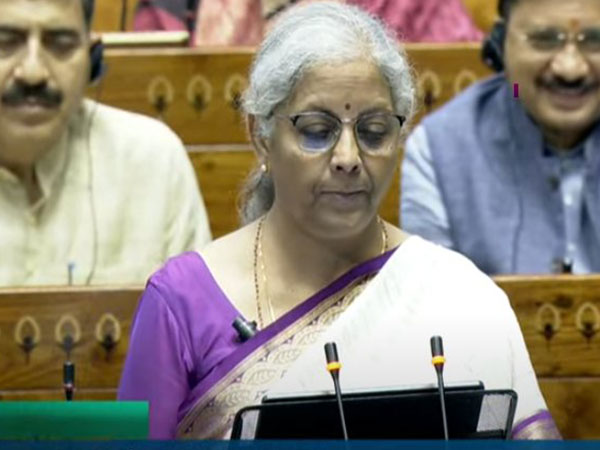
New Delhi: Indian Finance Minister Nirmala Sitharaman presented the first budget under Modi 3.0 government on July 23. Sitharaman’s Union Budget 2024 saw her announcing several key projects across agriculture, manufacturing and services sector. She also announced major changes in the capital gains tax regime and income tax regimes.
The Union Budget 2024-25 has introduced reforms that aim to stimulate economic growth and reflect a forward-thinking approach towards a common and ultimately drive sustainable growth for all Indians.
The budget focuses on nine priority areas---productivity and resilience in agriculture, employment & skilling, inclusive human resource development and social justice, manufacturing & services, urban development, energy security, infrastructure, innovation, research & development and next generation reforms. It includes major initiatives to eradicate poverty and empower the poor, under which a decision has been taken to construct 30 million houses for the poor.
The key highlight of the budget pertains to the employment and skilling sector. The Finance Minister announced five schemes to focus on 4.1 crore youth over five years with a central outlay of ₹2 lakh crore, a comprehensive internship scheme for one crore youth in top companies over five years, employment-linked incentives, including one month's wage support for first-time employees and significantly women-specific skilling programs and increased workforce participation.
The budget announced an increase in the collateral-free loans under the Mudra loan limit without a guarantee from Rs 10 lakh to Rs 20 lakh, empowering small business owners, particularly women, Dalits, backward, and tribal families, to pursue self-employment.
The newly announced Employment Linked Incentive scheme is designed to create millions of jobs. Under this initiative, the government will pay the first salary of youth securing their first job. This scheme, alongside support for skill development, higher education, and a 1 crore youth internship program, is expected to open new doors of opportunity for young individuals from villages and poor backgrounds.
The Finance Minister announced that the Union government will launch the PM - Janjatiya Unnat Gram Abhiyaan with an aim at achieving full saturation of basic facilities among five crore Scheduled Tribe families across 63,000 villages in tribal-majority areas and aspirational districts. The scheme, designed after the PM-JANMAN to achieve saturation of basic facilities for Particularly Vulnerable Tribal Groups, will be for Scheduled Tribe populations across the country.
Sitharaman also made significant announcements for states like Bihar and Andhra Pradesh, including increased infrastructure investment and special financial assistance. The announcement encompasses human resource development, infrastructure, and the creation of economic opportunities to transform the eastern region of the country, which includes Bihar, Jharkhand, West Bengal, Odisha, and Andhra Pradesh, into a driving force for achieving Viksit Bharat. Budget 2024 announced several measures on education and job creation.
“This budget details some of the specific actions to be initiated in the current year towards fulfilment of these priorities with potential for transformative changes. The budget also covers some of the previously made announcements with an intent to strengthen them and step up their implementation for expediting our journey towards the goal of Viksit Bharat,” Sitharaman said.
The budget envisions making every city, village, and household a hub of entrepreneurship and transform India into a global manufacturing hub. With emphasis on the vital role of the MSME sector, which predominantly employs the middle class and the poor, a new scheme to enhance credit ease for MSMEs and initiatives to extend the manufacturing and export ecosystem to every district have been introduced in the new budget. E-commerce export hubs and 100 food quality testing units will boost the One District One Product campaign.
The Union budget has allocated about ₹1.50 lakh crore to the agriculture sector. Almost all major schemes for farmers see an increase in allocation compared to previous budgets. With plans to create Vegetable Production Clusters to provide small farmers with new markets and better prices while ensuring increased availability of fruits and vegetables for the middle class, a significant portion of the budget is dedicated to farmers.
Adopting a truly inclusive approach the budget has encompassed regional growth as well. India-funded projects in the neighbourhood received the bulk of the allocation for the Ministry of External Affairs under the Union Budget. Nepal secured an allocation of ₹700 crore, which is a jump of ₹150 crore from previous year’s allocation of ₹550 crore. Sri Lanka, which has a number of India-funded projects, has received ₹245 crore, an improvement of ₹95 crore over last year’s funding of ₹150 crore.
Proving that India is committed about moving towards a greener future, the budget has for the first time attempted to address pollution and emissions. Sitharaman’s Budget speech signalled that polluting industries, such as iron, steel, and aluminium will have to conform to emission targets. She said, “A roadmap for moving the ‘hard to abate’ industries from ‘energy efficiency’ targets to ‘emission targets’ will be formulated. Appropriate regulations for transition of these industries from the current ‘Perform, Achieve, and Trade’ mode to ‘Indian Carbon Market’ mode will be put in place.”
Prime Minister Narendra Modi has lauded the budget's sharp focus on the youth, backward sections, women and middle class as also on manufacturing and infrastructure sectors, and asserted that the proposed employment-linked incentive schemes will create crores of new jobs. "This visionary budget will uplift and empower every stratum of our society, paving the way for a brighter future for all," he said, stressing his government's commitment to generating employment and self-employment opportunities.
The Indian Budget 2024-25 is truly transformative and brings forth reforms that underscore a commitment to a transparent, simplified, and equitable growth to develop a more investment-friendly environment, stimulate economic activity, and ultimately drive sustainable growth for all Indians.